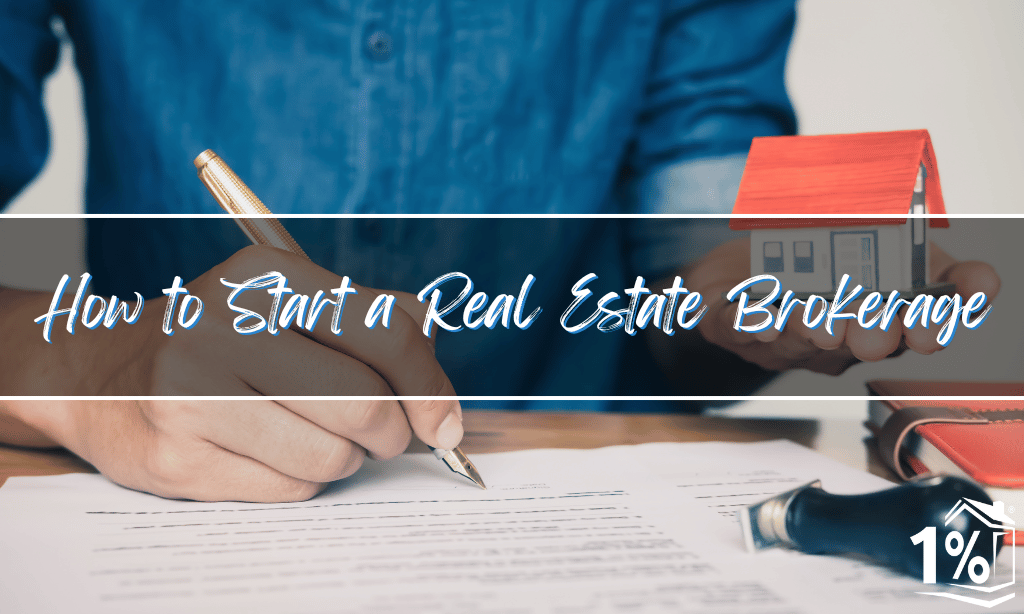For many of us, the idea of owning our own business is a dream scenario. Why wouldn’t it be? Sure, there’s a lot more responsibility, but it also means not having to answer to anyone, and potentially a lot more income.
When it comes to those of us in the real estate industry, this means starting your own brokerage. If you have an entrepreneurial spirit, a strong work ethic, and the ability to motivate agents, it’s the perfect fit. However, even if you possess all of those qualities, opening any business is easier said than done.
Building your own brokerage from the ground up can be difficult to say the least. In addition to the cost, there are things like branding and name recognition to take into account.
In this guide on how to start a real estate brokerage, we’ll explain what a real estate broker is, how much money you can expect to make, and of course, how to start one.
Defining a real estate brokerage
If you’re an agent, then this is knowledge you already have. However, for anyone thinking of entering the real estate industry, it’s important to know exactly what a brokerage is.
While you occasionally hear the terms used interchangeably, a broker and an agent are not the same. They both function as intermediaries between buyers and sellers of property, but there are distinct differences.
A real estate agent is licensed in their state to help buy or sell a home for a commission. However, they are not able to do this on their own. They must work for a real estate broker.
Real estate brokers, however, are able to work independently. They may act as an agent, and hire other agents to work under their supervision. Not only do they collect commissions for any deals they do on their own, but they also make a commission for any sale completed through their brokerage.
Both agents and brokers are required to pass a state exam in order to be licensed. Typically, the broker exam is more difficult because of the added responsibilities. Many brokers start off as agents, then acquire the additional licensing when they are ready to start their own brokerage.
A brokerage is the firm that a broker is the head of. There may be several agents under the umbrella of a brokerage, or occasionally a broker chooses to work alone. When employing other agents, brokers are typically responsible for marketing expenses and advertising. A brokerage may or may not have a physical office, depending on the model.

Cost of starting a real estate brokerage
Real estate brokerages, like any new business, take time and money to start. Depending on the type of brokerage, this number can vary greatly. You’ll need to be sure you’re financially able to start a brokerage.
Factors to consider
- Fees associated with registering a business
- Licensing and permit fees
- Accounting software or services
- Opening and ongoing marketing expenses
- Insurance
- Office space
- Furniture, and other office supplies
- Utilities and deposits
- Website build and launch
- Recruiting, hiring, and training agents
As you can see, there are a lot of costs associated with opening a brokerage. Chances are, you’re looking a bare minimum of $10,000. Realistically, this number could reach into the hundreds of thousands depending on the type of brokerage you’re starting.
A franchise for instance would require an initial franchise fee. This will usually range from $10,000-$50,000. The franchisor may also have other requirements you must follow that could translate to additional costs.
However, buying a real estate franchise such as with 1 Percent Lists, can help reduce your branding, marketing, and training costs. There is also no minimum number of agents you’re required to maintain, and you can operate without a physical office.
In many cases, a brokerage won’t start making money right away. That’s why, In addition to the funds needed to start the business, you’ll also want to have a safety net. Typically, this would be 3 months worth of operating funds, including employee salaries.
How much a real estate brokerage makes
The amount that a brokerage earns can vary greatly depending on a number of factors. For this reason, it’s difficult to offer an average or even a range. What we can explain is how a brokerage is paid and how much money that can translate into for the broker.
As we’ve already mentioned, a brokerage can have as few as one person, the broker themself, or up to hundreds of agents working for it. This will of course directly impact how much revenue a brokerage brings in.
When working independently, a broker would not have commission to split with additional agents. While this means more money per transaction, it very likely means a lot less deals. The more agents the more listings and sales. More sales means more money.
Traditionally, a real estate transaction has paid a total of 5%-6% of a property’s sale price. This is split between the brokerage representing the seller, and the brokerage representing the buyer. So anywhere from 2.5%-3.0% going to each brokerage.
If we were to look at a property that sells for $300,000 based on the traditional commission model, that would be somewhere between $7,500 and $10,000 going to each brokerage. For a broker that handled all aspects of the deal, that commission would be all theirs. When a brokerage employs other agents to handle transactions, the commission split is usually between 30%-50% with the agent. This puts the range that a brokerage would gross at $3,750-$7,000.
These numbers are not set in stone, however. There are different types of brokers out there that handle commissions in different ways. Flat-fee brokers charge a set fee to sell a home as opposed to the traditional commission model. Usually anywhere from $3,000-$5,000. There are also discount real estate brokers that charge a lower rate of commission. This can sometimes be as little as 1%.
If you’re buying a real estate franchise, then there are also recurring royalties that must be paid to the franchisor. In most cases, it is 3%-6% of the commission from the sale of each home. Unlike what a seller pays, this is based on the commission, not on a property’s sale price.
What a broker gets paid
So, now that we have an idea of how a brokerage brings in its money, what does that mean for the broker?
Whether working on their own, or with agents selling for the brokerage, a broker will typically take a salary. Obviously, a broker can’t keep all of the commissions that are split, due to operating fees of the business. This salary will typically range from $45,000-$85,000. The salary may start on the lower end, and then continue to grow with the business.
A broker can also earn money based on any deals they do themselves, and take a part of the commission from each sale. Again, the amount will vary, but can certainly be in excess of $40,000 annually. Depending on the success of the brokerage, this number can be much higher.

Steps to starting a real estate brokerage
Now we’ve established what a brokerage is, the costs associated with starting one, and what you can expect to earn. If you’ve decided opening a brokerage is right for you, then you’ll need to know the proper steps to get started.
Meeting state requirements
If you haven’t done so already, the first thing you’ll need to do is pass the broker exam. Some states require that you already be licensed as an agent for a specific number of years to take the exam.
You may need to take additional courses in order to pass the exam. These can include real estate principles and practices, escrow, appraisal, and real estate economics among others.
Prepare a business plan
In order to give your brokerage the best odds of success, you’ll absolutely need a business plan. This will allow you to focus on both long and short term goals.
You’ll need to figure out what your mission, vision, and values are. Also, what differentiates you from the competition? Chances are you’re not the own brokerage in town, so taking the time to identify your target client will greatly benefit you.
Are you buying a franchise or starting an independent brokerage? Buying a real estate franchise can be great when it comes to things like branding and marketing. If you’re considering starting your own independent franchise, then these are aspects that will take a lot of thought and planning.
Choose your office location
As a broker, you’ll need to provide your agents the option to work somewhere they can be successful and productive. This can be a brick and mortar office, or a virtual setting.
For a physical office, you must decide how large of a space you’ll need. In addition, keep in mind that it will require furniture, computers, phones, and additional employees. This of course can be costly, but can also validate a higher commissions split between you and the agents.
A virtual office can save you a lot of money and time, particularly when first starting out. Many agents may also be more comfortable working from a virtual setting. You also have the ability to exchange being financially responsible for things like computers for a lower commission split.
Remember, if you’re thinking of going the franchise route, some companies may require a physical office. They might even be able to dictate what furniture you can have and have signage requirements. It’s important to do thorough research when choosing a franchisor.
Determine your staffing needs
Unless you’re buying a franchise that requires it, you don’t necessarily need to immediately hire a team. However, as your brokerage grows, you may not have the time to do all the work yourself.
As time goes on and you continue to build your business, you’ll want to make sure you hire a competent and solid team. This will ensure that your standards are upheld.
Positions like an operations manager, accountant, trainer, head of marketing, and an IT person can be critical. These people are there to support not only you, but your agents as well.
Bottom Line
Starting a real estate brokerage can no doubt be a difficult task. It requires preparation, dedication, and long hours to do it right.
However, by setting realistic expectations, having a good foundation, and with the proper research and planning, you’ll be setting yourself up for success!

